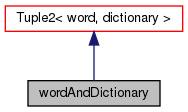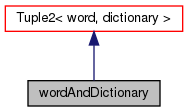Tuple of a word and dictionary, used to read in per-field options for function objects in the following syntax: More...


Public Member Functions | |
| wordAndDictionary () | |
| Construct null. More... | |
| wordAndDictionary (Istream &) | |
| Construct from Istream. More... | |
| ~wordAndDictionary () | |
| Destructor. More... | |
 Public Member Functions inherited from Tuple2< word, dictionary > Public Member Functions inherited from Tuple2< word, dictionary > | |
| const char *const | typeName ("Tuple2<word,scalar>") |
| Tuple2 () | |
| Null constructor for lists. More... | |
| Tuple2 (const word &f, const dictionary &s) | |
| Construct from components. More... | |
| Tuple2 (Istream &is) | |
| Construct from Istream. More... | |
| const word & | first () const |
| Return first. More... | |
| word & | first () |
| Return first. More... | |
| const dictionary & | second () const |
| Return second. More... | |
| dictionary & | second () |
| Return second. More... | |
Friends | |
| Istream & | operator>> (Istream &, wordAndDictionary &) |
| Ostream & | operator<< (Ostream &, const wordAndDictionary &) |
Additional Inherited Members | |
 Static Public Attributes inherited from Tuple2< word, dictionary > Static Public Attributes inherited from Tuple2< word, dictionary > | |
| static const char *const | typeName |
Tuple of a word and dictionary, used to read in per-field options for function objects in the following syntax:
fields ( p { option1 true; option2 false; }
U
T { option1 false; } );
IO is like the tuple, except that there are no enclosing parentheses, and if the dictionary is empty then '{}' is omitted. The latter means that in the absence of any options the syntax becomes that of a wordList, which means it can be used for argument parsing for input of that form.
Definition at line 80 of file wordAndDictionary.H.
Construct null.
Definition at line 30 of file wordAndDictionary.C.
| wordAndDictionary | ( | Istream & | is | ) |
Construct from Istream.
Definition at line 36 of file wordAndDictionary.C.
References IOstream::check().

| ~wordAndDictionary | ( | ) |
Destructor.
Definition at line 48 of file wordAndDictionary.C.
|
friend |
|
friend |